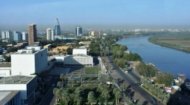|
Sudan Profile |
Sudan Profile |
Sudan Profile | Sudan Profile |
|
|

When Sudan recorded its first cases of Covid-19 in 2020, a raft of precautionary measures were introduced, including curfews and lockdowns beginning in Khartoum and spreading to other states. Sudan’s borders were also closed as was civil aviation. May saw an escalation of Covid-19 cases across the country placing already thinly-stretch healthcare facilities even further. Unrest in the country was further provoked by heavy and continuous rainfall which caused a devastating flood across 17 out of the 18 Sudanese states with the Blue Nile reaching water levels not seen for nearly a century. On June 30, hundreds of thousands of people participated in the ‘March of the Millions' prompting Prime Minister Hamdok to pledge to set the transitional period ‘back on course’.
This ongoing unrest erupted into a full civil war in 2023, reflecting the power struggle between the Sudanese Armed Forces (SAF) still led by General Abdel Fattah al-Burhan and the Rapid Support Forces (RSF, a force that evolved from so-called Janjaweed militias that fought during the 2000s in the Darfur region led by General Mohamed Hamdan Dagalo, also known as Hemedti). At its core is a disagreement over the integration of the RSF into the SAF and the future political structure of Sudan. This conflict has resulted in a massive humanitarian crisis, with nearly three million displaced Sudanese fleeing to already unstable areas in Chad, Ethiopia, and South Sudan, overrunning refugee camps. Some have been displaced within Sudan itself where access to basic necessities like food, water, and healthcare is severely limited for many. There are concerns that the ongoing conflict could lead to the fragmentation or collapse of the Sudanese state itself. Against this backdrop of bloody conflict, generations of children have been born, mostly into extreme poverty in a country that has had its infrastructures ravaged by war and its economy shattered. Sudan has been described at the World's worst humanitarian crisis, and its war problems have been compounded by harsh famines, illness and disease. It's hard to imagine living in a land where there is only one trained doctor for every 100,000 people, where more than half of all children don't attend school so will struggle to find employment in a country where so many don't work and where a quarter of a million people are living in refugee camps. But worse than that, as Sudan has had little more than a decade of stability since its independence, so many children have grown up knowing nothing but fear, conflict, death of family members, rape and abduction to be trafficked elsewhere. It is these scars that will take the longest to heal as Sudanese children do not have any concept of normality to cascade down to their children to help build a brighter future. Work programs in the Sudan help hundreds of thousands and include getting food supplies to severely malnourished children, running orphanages, water projects, education projects, providing seeds and tools, and very simple yet effective ideas such as the provision of chickens so families have an additional source of food and are able to sell surplus eggs for additional monies for the necessities of life. Check out our Sudan News pages for up-to-date information about Sudan's situation. |












 Despite this, military officers still loyal to Bashir, attempted a military coup in September 2021, which was thwarted by government forces, however, on 25th October 2021, the Sudanese military, led by General Abdel Fattah al-Burhan (right), took control of the government in another military coup. Al-Burhan dissolved the Sovereignty Council, and established himself as the de facto head of state of Sudan and the Commander-In-Chief of the Sudanese Armed Force. At least five senior government figures were initially detained and Hamdok refused to declare support for the coup, instead appealing for popular resistance. Faced with internal and international pressures, al-Burhan declared his willingness to restore the Hamdok Cabinet on 28th October and on 21th November 2021, Hamdok and al-Burhan signed a 14-point deal that reinstated Hamdok as prime minister, with a commitment to releasing all political prisoners detained during his coup, however facing continued unrest, Hamdok resigned on 2 January 2022.
Despite this, military officers still loyal to Bashir, attempted a military coup in September 2021, which was thwarted by government forces, however, on 25th October 2021, the Sudanese military, led by General Abdel Fattah al-Burhan (right), took control of the government in another military coup. Al-Burhan dissolved the Sovereignty Council, and established himself as the de facto head of state of Sudan and the Commander-In-Chief of the Sudanese Armed Force. At least five senior government figures were initially detained and Hamdok refused to declare support for the coup, instead appealing for popular resistance. Faced with internal and international pressures, al-Burhan declared his willingness to restore the Hamdok Cabinet on 28th October and on 21th November 2021, Hamdok and al-Burhan signed a 14-point deal that reinstated Hamdok as prime minister, with a commitment to releasing all political prisoners detained during his coup, however facing continued unrest, Hamdok resigned on 2 January 2022.


